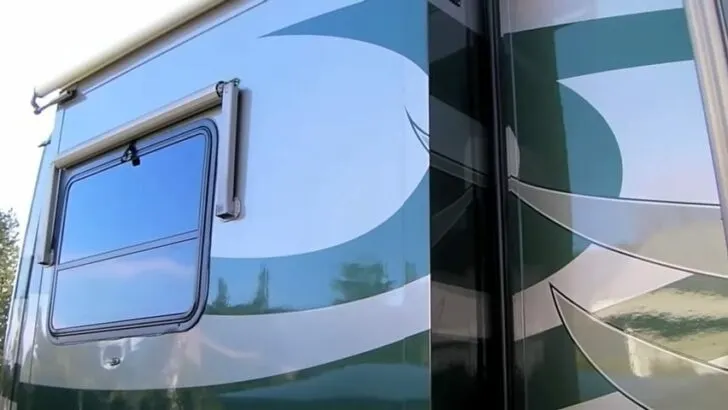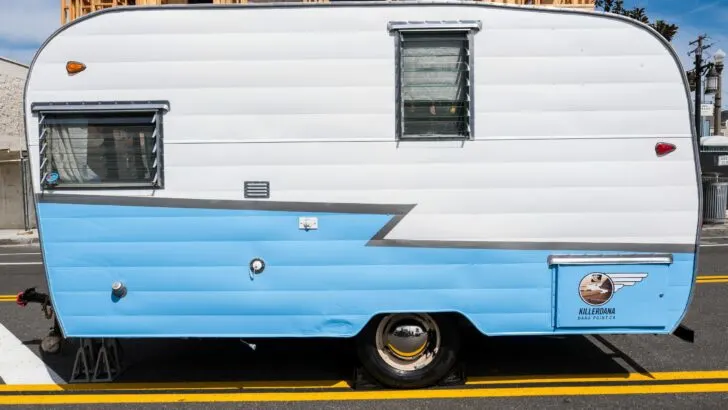Buying an RV involves a multitude of important considerations. We’re all quick to consider things like the floorplan, fuel mileage, sleeping capacity, the size of holding tanks, and whether we want to buy new or used. But one item that’s easy to overlook is an extended RV warranty. Is it worth the cost? Do you really need it?
In today’s post, we’ll look carefully at extended RV warranties – what they cover, how much they cost, how to find the right warranty for you, and whether an extended RV warranty is likely to be worth your money.

An RV is a combination home and travel vehicle, so an extended RV warranty may need to cover everything from the engine to the plumbing system.
Homes and vehicles are two of the more major purchases most of us make as adults. So when you’re making a single capital purchase that fits into both categories simultaneously, that can mean considering the requirements of both.
When buying an RV (whether or not you intend to live in it full-time as we do), you’re buying a vehicle and a home in one fell swoop. And that means there’s extra complexity involved that can make it more complicated to keep everything in proper working order.
For some, an extended warranty on a combination travel vehicle & home may be well worth the cost. For others, maybe not so much. Let’s take a look …
What is an Extended RV Warranty?
An extended RV warranty is intended to cover the cost of major repairs after your original manufacturer’s warranty expires. Extended warranties are often sold by dealers, but can also be purchased from third-party sellers.
What Does an Extended RV Warranty Cover?
This is the $64,000 question, and there are a few different answers, depending on the type of warranty purchased. This is very important because you need to be crystal clear on the type of warranty you’re getting before you buy. You don’t want surprises at claim time (which is exactly when they’ll happen). The warranty you’re purchasing should provide all of the coverage you need when you need it.

There are different types of extended RV warranties available, depending on what components you would like covered.
The three most common types of extended RV warranty are exclusionary, comprehensive, and coach-only.
An Exclusionary RV Warranty typically provides the highest level of coverage available. As the name would indicate, however, there are exclusions to the coverage (i.e. what ISN’T covered), and you need to be aware of exactly what those exclusions are.
With this type of warranty, the mechanical components of your RV should be covered, with the exception of the exclusions noted in your policy. This should include such items as refrigerators, slides, air conditioners, and even the engine. Exclusions may include regular maintenance and pre-existing conditions, as well as structural components such as paint, windows, and fabric.
The key to an exclusionary RV warranty that benefits you is to be completely aware of ALL of the exclusions before buying so that you understand what’s covered and what isn’t. But because that’s exactly what they list, it’s easy to find & understand what they are.
A Comprehensive RV Warranty will list precisely what IS covered, so it’s imperative that you take the time to read the warranty thoroughly. Coverage could include everything from the engine and transmission to brakes and steering components, as well as RV items such as your plumbing and electrical systems, refrigerator, and air conditioning. Again, though – read the warranty carefully to make sure it lists everything you want to cover with your extended RV warranty. Anything that ISN’T listed, won’t be covered.
The Coach Only RV Warranty may seem to be self-explanatory in that we’d expect it to cover only components that are part of the coach – or “house” – portion of your RV, and not the engine or powertrain. This is usually the case, but once again, it’s important to read the warranty thoroughly to make sure it will cover the items you want to be covered. Surprises when submitting a claim are exactly what you want to avoid. Don’t assume anything.

Coach-only warranties generally cover items like slides, air conditioners, and refrigerators.
The coach-only warranty should cover slides, refrigerators, water/plumbing systems, coach air conditioning, leveling jacks, and much more. But coach-only warranties can be either exclusionary or comprehensive, so be clear on which type you’re buying, and make sure it covers everything you want to cover.
This type of policy is typically useful when an RV is new (or newer) and the engine, transmission, drivetrain, and/or chassis are still under their individual manufacturer’s warranties (which typically run longer than the house part of the RV)… but your RV manufacturer’s warranty is about to expire. Since one year is a common length for an RV manufacturer’s warranty, the approach of the 1-year-old mark is a common time to be looking into this option, assuming you didn’t already purchase a policy the day you picked up your new rig.
Of course, if you own a towable RV, drivetrain considerations won’t be a factor, since your rig doesn’t have one.
What to Look For in an Extended Warranty Policy
As we’ve noted, one of the main concerns around an extended RV warranty is knowing what IS covered and what ISN’T covered before you choose a policy. But there are other important factors to consider as well.
It’s important to know what the claims procedure is in advance, and how the reimbursement system works with the warranty provider. It’s also important to know what the overall cost of the warranty will be, as well as any “fine print” details such as “out-of-the-RV” expense coverage, limits on where the repair work can be done, and any other limitations that may be noted in the policy.
Finally, the warranty provider’s reputation for customer service and response to claims is exceedingly important. This is best researched by reading reviews from current and former warranty owners who have experience with the warranty provider. We can’t stress this enough: read reviews, and more reviews, and still more reviews. How a company has historically treated its customers is a good barometer of how you can expect to be treated by the same provider.
How Much Does an Extended RV Warranty Cost?
The cost of an extended RV warranty varies widely based on the type of RV being covered, the type of coverage you’re seeking, the duration of coverage, and the company providing it. If you have a small travel trailer that you use periodically for some summer camping, you could pay up to $1,000 for coverage (depending on the type of coverage you choose). If you seek full coverage for a luxury motorhome in which you live full time, you could spend as much as $20,000.

An extended warranty on a travel trailer would be less costly because it doesn’t involve engine components and may be subject to less use.
The only way to determine the cost of an extended RV warranty for your particular rig is to contact warranty companies that interest you, clearly express the type of coverage you’re seeking, and ask for a quote for your RV.
How to Find the Right RV Warranty
To find the right extended RV warranty for you and your rig, you need to take the time to educate yourself. Seek input from friends who have experience with warranty claims, look for warranty providers with good reputations for solid coverage and great customer service, and make sure to obtain clear answers regarding what is covered, what is excluded, etc.
Again, you’ll want to read the warranty thoroughly and ask questions until you’re satisfied that you’re being well covered in all desired areas.
It’s also worth repeating the advice to read lots and lots of reviews from people who have made claims to understand the service they received.
Is Buying an Extended RV Warranty Worth It?
The answer to whether or not an extended RV warranty is worth the investment is personal for each RV owner. We’ve never purchased one ourselves, but that’s because we do a lot of DIY maintenance and repairs and are pretty well “self-insured” in this way. But that’s not the right approach for everyone, and peace of mind can be worth a lot, especially if you’re not particularly handy.
Now over 16 years old, our RV has of course required various repairs over the years, even after the original warranty expired. But we’ve been lucky that we’ve been able to fix so many things ourselves, and those problems we’ve had to take to a shop haven’t broken the bank. The money we’ve saved by having zero premiums or cost for an extended warranty will still be in the bank should we need to pay out of pocket for something we can’t handle ourselves.
Of course we still need to buy any required parts for DIY repairs, but labor is the most expensive element of almost any repair job. Our overall choice, for ourselves, is that we can either be guaranteed to spend money to protect against problems that may never materialize, or only pay IF they actually happen. The gamble of course is hoping that there’s never such a major failure that it exceeds all the premiums we’ve avoided paying all these years.
For some RV owners, that peace of mind comes in the form of full extended warranty coverage of both the vehicle and house/coach portions of the RV. Others may be comfortable with handling their own DIY maintenance and repair to coach components, but not issues related to the engine or drive train.
There’s one other slightly intangible aspect to all this, which we experienced the day our original factory warranty ended. That’s the freedom to just go ahead and fix a problem ourselves whenever we’re able to. While we were under warranty, we hesitated to do that, because, well… we’re under warranty, so why do that, right? That led us to make appointments for all sorts of things we could have fixed ourselves. And it’s surely not just a full-timer’s thing to hate service appointments, is it?
The logistics of getting to, dealing with, and waiting around for and during service appointments sucks. We were actually relieved the day our warranty ended, because there was no more waiting to get things fixed.
So, the value of an extended RV warranty is a determination that is best left to the individual RV owner, as there are a lot of factors that make this a very personal decision. Plus, you may need to consider how much you’re paying for RV insurance itself, and adjust your extended RV warranty coverage to account for that.
Conclusion
An extended RV warranty can be a significant money-saver or it can be a waste of your hard-earned money. The trick is to determine whether an extended warranty makes sense for you, and then to thoroughly research providers of extended RV warranties to make sure you’re not being taken for a ride.
Using the experiences of other RVers through direct conversations and the extensive reading of reviews will help you to determine whether or not you have your eyes on a warranty company that will serve you well when it comes time to make a claim.
Geek Out with Us Every Week
Join our newsletter to learn about all things RV-related. Every week we offer free tips, tricks, product reviews, and more to our online community of RVers. Whether this is your first time on the road or you’re a seasoned expert, we’d love for you to geek out with us!


Denise Lamont
Thursday 3rd of August 2023
We bought ext warranty for our 2019 Gt5 GEORGETOWN 34 FOOT MOTOR COACH,. Bought in 2020 we are second owner.Only 4000 miles,reg maintenance done by the book, covered,washed and waxed in driveway when not in use. Roof leak, whole roof est damage is $ 21,000. Twenty one thousand! We paid 130,000 for the rig. NOT COVERED BY WARRANTY BOUGHT FROM GOOD SAM. VERY DISSAPOINTED.
TheRVgeeks
Thursday 3rd of August 2023
Oh no, Denise! That's horrible! So sorry to hear about the roof leak and that Good Sam didn't cover it! YIKES!
Joe
Monday 22nd of August 2022
Thank you
John Koenig
Wednesday 7th of July 2021
I take issue with your casual use of the term "WARRANTY". If I understand the law correctly FEW if ANY are true WARRANTIES. I believe "SERVICE CONTRACT" is the proper description and, there IS a legal difference between a TRUE warranty vs a Service Contract. I too have chosen to "self insure" my Super-C. If for some unfathomable reason I ever choose to purchase a service contract, I would insist on an EXCLUSIONARY contract where anything not specifically exluded would be covered. A BIG "gotcha" not mentioned in your article is that service contracts OFTEN contain language which REQUIRES the purchaser to perform maintenance / service the provider deems necessary AND, may specify where / who MUST perform said work. Miss a single required service and, the purchaser gives the contract seller a way to void said agreement AND keep whatever monies you've paid leaving the purchaser unprotected.
TheRVgeeks
Wednesday 7th of July 2021
Hi John. Just to clarify, it's not OUR use of the word warranty. That's what they're called in the industry. Accurate or not, that's what they're known as. We're with you on the "self-insure" attitude, which is why we've been doing it since our factory warranty expired. We just realize that our choice isn't for everyone, and as seen here in the comments (and others on various RV forums), it goes strongly in both directions. People generally love 'em or hate 'em.
John Schretlen
Wednesday 7th of July 2021
If there is ever a subject about "what is the best choice" there are usually two items that cause 80% of debate: Tires and warranties. The thing is that BOTH sides of the debate holds favour for very good reason; and a history to back up the choice.
I tend to do as much repair/maintenance as I can and, like you, have not purchased extended warranties for our coach. It's now ten years old and I doubt that any warranty would be cost effective.
One thing I did not consider until I read this post is the point you made here: "We were actually relieved the day our warranty ended, because there was no more waiting to get things fixed."
TheRVgeeks
Wednesday 7th of July 2021
So true, John. Tires and warranties are like the Ford -vs- Chevy debates of the RVing world. LOL!
Terry Lee
Wednesday 7th of July 2021
One of my first "fixes" on my new RV was a compartment lock that didn't work. Choices? 1-1/2 hours round trip to a dealer (plus waiting) or 1/2 hour of my own time, I chose the latter. FWIW I never buy extended warranties on anything. 50 years later, no regrets.
TheRVgeeks
Wednesday 7th of July 2021
Aren't those kinds of fixes the best, Terry?! Love getting something done cheaper, easier, and faster than taking it in to the shop. We hope we have as successful a run as you've had without an extended warranty! ????